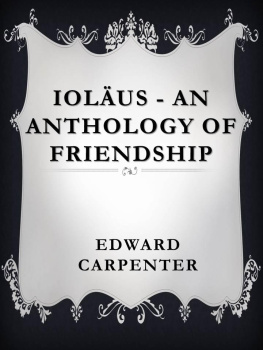Carpenter - Ioläus: An Anthology of Friendship
Here you can read online Carpenter - Ioläus: An Anthology of Friendship full text of the book (entire story) in english for free. Download pdf and epub, get meaning, cover and reviews about this ebook. City: Place of publication not identified, year: 2010, publisher: Mariana de Lacerda Oliveira;Nabu Press, genre: Science. Description of the work, (preface) as well as reviews are available. Best literature library LitArk.com created for fans of good reading and offers a wide selection of genres:
Romance novel
Science fiction
Adventure
Detective
Science
History
Home and family
Prose
Art
Politics
Computer
Non-fiction
Religion
Business
Children
Humor
Choose a favorite category and find really read worthwhile books. Enjoy immersion in the world of imagination, feel the emotions of the characters or learn something new for yourself, make an fascinating discovery.
Ioläus: An Anthology of Friendship: summary, description and annotation
We offer to read an annotation, description, summary or preface (depends on what the author of the book "Ioläus: An Anthology of Friendship" wrote himself). If you haven't found the necessary information about the book — write in the comments, we will try to find it.
Ioläus: An Anthology of Friendship — read online for free the complete book (whole text) full work
Below is the text of the book, divided by pages. System saving the place of the last page read, allows you to conveniently read the book "Ioläus: An Anthology of Friendship" online for free, without having to search again every time where you left off. Put a bookmark, and you can go to the page where you finished reading at any time.
Font size:
Interval:
Bookmark:
IOLUS
AN ANTHOLOGY OF FRIENDSHIP
EDITED BY
EDWARD CARPENTER
" And as to the loves of Hercules it is difficult to record them because of their number. But some who think that Iolus was one of them, do to this day worship and honour him; and make their loved ones swear fidelity at his tomb ." ( Plutarch ) |
NEW YORK
MITCHELL KENNERLEY
MCMXVII
[1917]
CONTENTS
PREFACE TO FIRST EDITION |
FRIENDSHIP-CUSTOMS IN THE PAGAN AND EARLY WORLD |
THE PLACE OF FRIENDSHIP IN GREEK LIFE AND THOUGHT |
POETRY OF FRIENDSHIP AMONG GREEKS AND ROMANS |
FRIENDSHIP IN EARLY CHRISTIAN AND MEDIVAL TIMES |
THE RENAISSANCE AND MODERN TIMES |
THE degree to which Friendship, in the early history of the world, has been recognized as an institution, and the dignity ascribed to it, are things hardly realized to-day. Yet a very slight examination of the subject shows the important part it has played. In making the following collection I have been much struck by the remarkable manner in which the customs of various races and times illustrate each other, and the way in which they point to a solid and enduring body of human sentiment on the subject. By arranging the extracts in a kind of rough chronological and evolutionary order from those dealing with primitive races onwards, the continuity of these customs comes out all the more clearly, as well as their slow modification in course of time. But it must be confessed that the present collection is only incomplete, and a small contribution, at best, towards a large subject.
In the matter of quotation and translation, my
p. vi
best thanks are due to various authors and holders of literary copyrights for their assistance and authority. In cases where no reference is given the translations are by the Editor.
E. C.
FRIENDSHIP-CUSTOMS, of a very marked and definite character, have apparently prevailed among a great many primitive peoples; but the information that we have about them is seldom thoroughly satisfactory. Travellers have been content to note external ceremonies, like the exchange of names between comrades, or the mutual tasting of each other's blood, but--either from want of perception or want of opportunity--have not been able to tell us anything about the inner meaning of these formalities, or the sentiments which may have inspired them. Still, we have material enough to indicate that comrade-attachment has been recognized as an important institution, and held in high esteem, among quite savage tribes; and some of the following quotations will show this. When we come to the higher culture of the Greek age the material fortunately is abundant--not only for the customs, but (in Greek philosophy and poetry)
p. 4
for the inner sentiments which inspired these customs. Consequently it will be found that the major part of this and the following two chapters deals with matter from Greek sources. The later chapters carry on the subject in loosely historical sequence through the Christian centuries down to modern times.
THE Balonda are an African tribe inhabiting Londa land, among the Southern tributaries of the Congo River. They were visited by Livingstone, and the following account of their customs is derived from him:--
"The Balonda have a most remarkable custom of cementing friendship. When two men agree to be special friends they go through a singular ceremony. The men sit opposite each other holding hands, and by the side of each is a vessel of beer. Slight cuts are then made on the clasped hands, on the pit of the stomach, on the right cheek, and on the forehead. The point of a grass-blade is pressed against each of these cuts, so as to take up a little of the blood, and each man washes the grass-blade in his own beer vessel. The vessels are then exchanged and the contents drunk, so that each imbibes the blood of the other. The two are thenceforth considered as blood-relations, and are bound to assist each
p. 5
other in every possible manner. While the beer is being drunk, the friends of each of the men beat on the ground with clubs, and bawl out certain sentences as ratification of the treaty. It is thought correct for all the friends of each party to the contract to drink a little of the beer. The ceremony is called 'Kasendi.' After it has been completed, gifts are exchanged, and both parties always give their most precious possessions." Natural History of Man. Rev. J. G. Wood. Vol: Africa , p. 419.
Among the Manganjas and other tribes of the Zambesi region, Livingstone found the custom of changing names prevalent.
" Sininyane (a headman) had exchanged names with a Zulu at Shupanga, and on being called the next morning made no answer; to a second and third summons he paid no attention; but at length one of his men replied, 'He is not Sininyane now, he is Moshoshoma'; and to this name he answered promptly. The custom of exchanging names with men of other tribes is not uncommon; and the exchangers regard themselves as close comrades, owing special duties to each other ever after. Should one by chance visit his comrade's town, he expects to receive food, lodging, and other friendly offices from him." Narrative of an Expedition to the Zambesi. By David and Charles Livingstone . Murray, 1865, p. 148.
p. 6
IN the story of David and Jonathan, which follows, we have an example, from much the same stage of primitive tribal life, of a compact between two friends--one the son of the chief, the other a shepherd youth--only in this case, in the song of David ("I am distressed for thee, my brother Jonathan, thy love to me was wonderful") we are fortunate in having the inner feeling preserved for us. It should be noted that Jonathan gives to David his "most precious possessions."
"And when Saul saw David go forth against the Philistine (Goliath), he said unto Abner, the captain of the host, 'Abner, whose son is this youth?' And Abner said, 'As thy soul liveth, O King, I cannot tell.' And the King said, 'Inquire thou whose son the stripling is.' And as David returned from the slaughter of the Philistine, Abner took him and brought him before Saul, with the head of the Philistine in his hand. And Saul said to him, 'Whose son art thou, young man?' And David answered, 'The son of thy servant Jesse the Bethlehemite.'
"And it came to pass, when he had made an end of speaking unto Saul, that the soul of Jonathan was knit with the soul of David, and Jonathan loved him as his own soul. And Saul took him that day, and would let him go no more home to his father's house. Then Jonathan and David
p. 7
made a covenant, because he loved him as his own soul. And Jonathan stripped himself of the robe that was upon him, and gave it to David, and his garments, even to his sword, and to his bow, and to his girdle." 1 Sam . ch. xvii. 55.
With regard to the exchange of names, a slightly different custom prevails among the Bengali coolies. Two youths, or two girls, will exchange two flowers (of the same kind) with each other, in token of perpetual alliance. After that, one speaks of the other as "my flower," but never alludes to the other by name again--only by some roundabout phrase.
HERMAN MELVILLE, who voyaged among the Pacific Islands in 1841-1845, gives some interesting and reliable accounts of Polynesian customs of that period. He says:--
"The really curious way in which all the Polynesians are in the habit of making bosom friends at the shortest possible notice is deserving of remark. Although, among a people like the Tahitians, vitiated as they are by sophisticating influences, this custom has in most cases degenerated into a mere mercenary relation, it nevertheless had its origin in a fine, and in some instances heroic, sentiment formerly entertained by their fathers.
Font size:
Interval:
Bookmark:
Similar books «Ioläus: An Anthology of Friendship»
Look at similar books to Ioläus: An Anthology of Friendship. We have selected literature similar in name and meaning in the hope of providing readers with more options to find new, interesting, not yet read works.
Discussion, reviews of the book Ioläus: An Anthology of Friendship and just readers' own opinions. Leave your comments, write what you think about the work, its meaning or the main characters. Specify what exactly you liked and what you didn't like, and why you think so.















